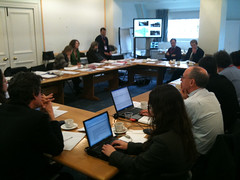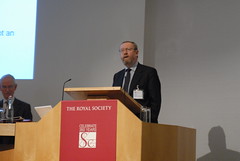Jerry Lemunyon, the Godfather of the P index, talks about future research needs....a short nterview by Phil Haygarth at the International P Workshhop in Seville
Sunday, 3 October 2010
Thursday, 29 April 2010
Phil Jordan demonstrates the catchment sampling system.....
Last week I was in Co Mayo to witness Phil Jordan demonstrating the set-up for the sampling of his mini-catchments programme....
Thursday, 15 April 2010
Miranda Kavanagh calls for raised awareness
Miranda Kavanagh talks about raising awareness
Originally uploaded by wq0109
Friday, 12 March 2010
North Wyke ECSFDI training event
 A successful day was enjoyed by all participants (ECSFDI staff and research scientists). This was helped along by glorious sunshine.
A successful day was enjoyed by all participants (ECSFDI staff and research scientists). This was helped along by glorious sunshine. Key messages from the day:
1) the need for robust guidance for on the ground staff is critical, 2) we require better ways to get the evidence to farmers to influence behavioural change (currently it is still coming from too many conflicting sources, often commercially funded), 3) simple but scientifically based rules of thumb are vital to help transfer knowledge to farmers and other land managers e.g. 1,000,000 people = 100 sheep in terms of approximate loading of FIOs to the catchment (Dave Kay, CREH), 4) we must learn from existing studies in the UK and around the world (in Ireland establishing the catchment programme has been a great success, but it must continue past 2011 to detect change in water quality due to reducing soil P status and changing farmer's behaviours; in addition they only used catchments with 100% buy in from farmers), 5) we need frameworks that can be used to understand the systems being studied e.g. a farm and be utilised to communicate not only between research scientists, but also between scientists and operational staff and with policy makers (Phil Jordan's (Teagasc) use of the Haygarth et al source-mobilization-delivery-impact continuum to link with environmental standards is an important advance as is the ecosystem service framework), 6) we need more holistic (chemical, biological and physical hazards and biodiversity) scientific studies on the effectiveness of mitigation methods e.g. riparian buffers for multiple functions e.g. diffuse pollution of water, GHG emissions, biodiversity and flood risk (good examples of this are Rich Brazier's research on the Holnicote Estate on Exmoor that is funded by Defra and the National Trust and the multi-agency funded Demonstration Test Catchments) , 7) and we really need to assess if certain mitigation methods are working as expected e.g. subsurface losses from pond systems in England and Wales (these are smaller water bodies than those in Ireland and tend not to have a synthetic liner-as this doubles the cost (Dave Kay)), 8) there is still a dearth of long term data on the effectiveness of many mitigation methods (a classic example from Scotland is the issue of up keep of fencing water courses; fencing of watercourses is very effective for reducing FIO loads (30% livestock exclusion ~ 60-80% reduction- Dave Kay) and last but not least 9) there is a need for robust quantitative models for source apportionment and the effectiveness of mitigation methods.
Loddington ECSFDI training event
Loddington CPD event
Originally uploaded by wq0109
Thursday, 11 March 2010
Demonstration test catchments RAG meeting
Yesterday I attended the research advisory group (RAG) for the Defra demonstration test catchments programme in Defra's Noble House. A busy day with some challenges ahead, not least a lot of money to spend and some kit to install in the Eden, Wensum and Hampshire Avon - pretty pronto. A longer term challenges to determine the mitigtion mechanisms for the future. Some work to do .........
Tuesday, 9 March 2010
Foresight Land Use Futures Launch, Feb 2010
Recently I attended the launch of the UK's Foresight report on Land Use at the Royal Society launched by John Beddington, the Cheif Scientific Advisor to the Government. Louise Heathwaite, my co-director from the Centre for Sustainable Water Management at Lancaster University, was also presenet as she had been a member of the writing team. I had played a very minor role as author of one of the papers feeding in on the future role of soils and land use. It was a well-managed lanch, was well-attended and seemed to be well-received, with little overt descent or controversy. However, what ws so obvious to me was the dominance of developers, economics and marketers whilst items so obviosuly important to the environmental sciences and to cathment change played a minor role alongside the debate about economic futures and the apparent need for property development. I cannot help worry short termism, the soils of the UK have taken tens of throusands of years to develop and provide many functions including feeding us and buffering our catchments. Any change of our land that involves sealing of soils will potentially reverse these years of soil formation. If we are to head off Beddington's 'perfect storm' then must avoid critical tipping points and plan for mutlifunctionality of soils and catchments - this is the route to a sustainable future. Two years ago the credit crunch provided an opportunity for a paradigm shift that seems to have passed us by. It seems we have a long way to go to change the world..... For more pictures of the event I took please see here. best Phil.
Friday, 26 February 2010
Training events for ECSFI staff

Phil Haygarth, Martin Blackwell, Clare Deasy and myself are organising parallel training events for ECSFDI staff on 11th March at Loddington (arable focus) and North Wyke (pasture/livestock focus). The objective is to provide CPD training events on diffuse pollution from agriculture and its control to catchment sensitive farming officers and coordinators and related professionals.
Thursday, 25 February 2010
Science Policy Success
The Science Policy Success conference was held at Edinburgh’s Dynamic Earth on Wednesday 7 October and Thursday 8 October 2009.
More than 100 Scottish Government staff, academics, scientists from the Scottish research institutes and individuals from the rural and environment agencies attended.
More than 100 Scottish Government staff, academics, scientists from the Scottish research institutes and individuals from the rural and environment agencies attended.
knowledge scotland: science-policy online resource
 Knowledgescotland is an important initiative to improve the links between science and policy.
Knowledgescotland is an important initiative to improve the links between science and policy.
Thursday, 14 January 2010
UK Cross Government Food Research and Innovation Strategy

The UK government has recently released it's food strategy - Food 2030 - for a sustainable and secure food system, linking social, environmental, health and economic factors, and in developing the policies to deliver this. This will include:
- a new multi-partner food security research programme, co-ordinated by BBSRC,
- a new Technology Strategy Board led Sustainable Agriculture and Food Innovation Platform, co-funded by Defra and BBSRC with up to £90M over 5 years, and
- a doubling of research investment in agriculture by DFID over the next five years.
Subscribe to:
Comments (Atom)

